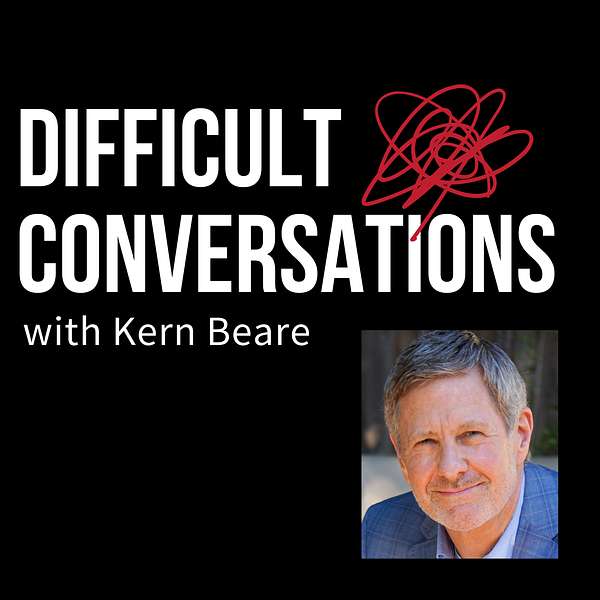
Difficult Conversations, with Kern Beare
Talking to people we disagree with can be fraught with fear and anxiety — triggering our fight/flight survival drive. We fight by arguing to win, or we flee by avoiding the conflict altogether. But to resolve our differences, we need to move beyond this ancient instinct and access our capacity for connection, creativity and compassion.
Join Kern Beare — founder of the Difficult Conversations Project and author of Difficult Conversations: The Art and Science of Working Together — as he explores how we can have conversations that can actually heal divides and change hearts and minds.
For more about Kern and his work, check out his website: www.difficultconversationsproject.org.
Difficult Conversations, with Kern Beare
Facing our Humanity: A Personal Story.
Use Left/Right to seek, Home/End to jump to start or end. Hold shift to jump forward or backward.
Thinking about the Russian invasion of Ukraine reminded me of a very personal experience I had years ago — one that taught me something about why it's so important to face our own humanity.
_______________________________
Kern Beare is the founder of the Difficult Conversations Project and the author of Difficult Conversations: The Art and Science of Working Together. He also facilitates a workshop based on his book, which is free for non-profit organizations and community groups.
Thinking about the Russian invasion of Ukraine reminded me of a very personal experience I had years ago — one that taught me something about the nature of evil.
I was going through a program to help me confront my past. Painful memories and emotions are not something we tend to want to relive, but the theory behind this program was that by doing so, the energy trapped in these negative experiences is released for more positive and creative purposes.
Confronting my past wasn’t just about facing how I’d been treated, however, but also how I’d treated others. During this 6-week program of intense personal reflection, I came face-to-face with my arrogance, my dismissiveness of those I considered “less than,” my disregard for the feelings of others, and just in general the pure selfishness of so many of my attitudes and behaviors.
At the peak of this intense experience, (or should I say at the bottom) I broke down.
In physics there’s something called the “uncertainty principle,” which states that we can’t know exactly both the position and the momentum of a given particle at the same time. Knowing more about one of those values necessitates knowing less about the other.
Facing the truth of our own humanity is a lot like that uncertainty principle. There are great things about us and not so great things about us – individually and collectively. But if we try to look at both aspects of our nature at the same time, if we continually expend energy balancing the scales, neither aspect is fully revealed. So it can be helpful to just focus on one of them, to see as clearly as possible what it teaches us about the human condition.
When I broke down I was focused completely on my dark side, the most negative aspects of my personality. Overwhelmed with emotion, I buckled over and sobbed, repeating to myself again and again, “I am Hitler! I am Hitler! I am Hitler!”
There it was, humanity’s symbol of the ultimate embodiment of evil, conjured up by my psyche for me to look at – and to see in myself.
I, of course, am not actually Hitler. But what I saw were the very qualities that, under certain circumstances, can lead in that direction: The insecurity over our own self-worth; the dehumanization of those we consider less than; the anger we feel over experiences of rejection and humiliation; and the self-aggrandizement, loss of perspective, and complete disconnection from our own moral compass that too often comes with having power over others. In whatever ways and to whatever degrees, such tendencies are part of us all.
Ever since that experience I’ve never looked at other people quite the same way. My righteous indignation over the greedy and intolerant behavior of others never reaches the same intensity. I can’t find the energy to hate other people, or turn them into inhuman monsters, no matter how egregious their behavior. To deny their humanity is to deny my own, and that I can no longer do.
This shift in perspective does not make me complacent. It does not diminish the energy and commitment I have to do my part to make the world a better place. But it does change how I go about it.
Being able to see aspects of myself in those who manifest humanity’s most harmful qualities not only keeps me from claiming the moral high ground, it also clarifies the harm in making that claim. Asserting the moral high ground only hides from us our own humanness, which has the unhelpful effect of making us very difficult for others to listen to. More importantly, it makes it impossible to acknowledge and address the true root cause of our ills – which is, in fact, our inability to confront our own role in creating these ills in the first place.
Rather than claiming the moral high ground, I’ve learned it’s more authentic and more productive to claim the moral humble ground, knowingly grateful that “there but for the grace of God go I.” It is from that place, and I believe that place only, that we’ll find the wisdom we need to heal our country and our world.